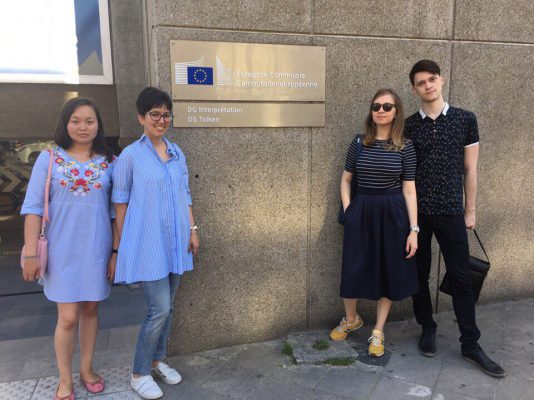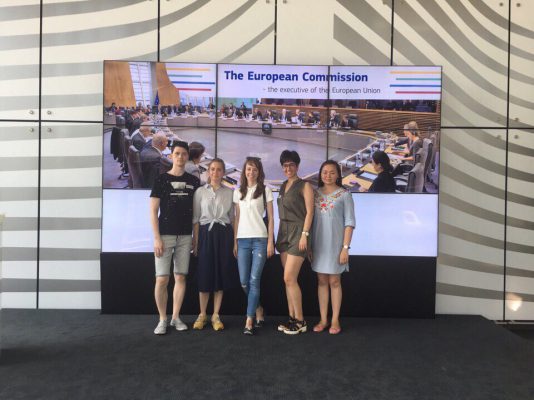Traineeship in the main EU institutions, 2017
 Our MA students spent almost 2 weeks in Brussels – the Belgium capital and heart of the European Union. During their study visit, Altyn Arupova, Adelya Bogdalova, Polina Karabalaeva and Dmitry Tarnovsky visited both the main EU institutions located in Brussels and the Organization for Economic Cooperation and Development in Paris. The internship programme included visits to the Directorates-General for Interpretation and Translation of the European Commission, the Directorate-General for Interpretation and Conferences of the European Parliament, interpreting of current meetings in a “dummy booth”, as well as a visit to the OECD Language Service. The MA students attended meetings on monetary and transport policies, interpreted the discussion on a project of creating a new information portal and database on aquaculture. All the above-mentioned institutions gave the students a cordial welcome, and people who work there impressed the visitors with their interest, enthusiasm and devotion to their occupation.
Our MA students spent almost 2 weeks in Brussels – the Belgium capital and heart of the European Union. During their study visit, Altyn Arupova, Adelya Bogdalova, Polina Karabalaeva and Dmitry Tarnovsky visited both the main EU institutions located in Brussels and the Organization for Economic Cooperation and Development in Paris. The internship programme included visits to the Directorates-General for Interpretation and Translation of the European Commission, the Directorate-General for Interpretation and Conferences of the European Parliament, interpreting of current meetings in a “dummy booth”, as well as a visit to the OECD Language Service. The MA students attended meetings on monetary and transport policies, interpreted the discussion on a project of creating a new information portal and database on aquaculture. All the above-mentioned institutions gave the students a cordial welcome, and people who work there impressed the visitors with their interest, enthusiasm and devotion to their occupation.
The European colleagues kindly shared their professional experience: they explained specificity of working with terminology databases, interpreting at different meetings and translating different types of documents, and many other things. They also took an interest in the Russian market of translation and interpretation services and were truly surprised with “flexibility” of their Russian colleagues: in the EU, both translators and interpreters usually work only into his/her mother tongue. If someone works into a B language, then a native speaker checks and edits the translation afterwards. Flexibility of language professionals in Russia also shows itself in the fact that they deal both with translation and interpretation, as it is the market demand. However, the EU colleagues’ c areful attention to details, their openness to novelties and readiness to change apparently help them maintain the high-quality level of their work.
areful attention to details, their openness to novelties and readiness to change apparently help them maintain the high-quality level of their work.
5lvbk58mwroThe specificity of functions and procedures of the EU institutions influences translators’ and interpreters’ work as well. The MA students experienced it in the European Commission, the European Parliament and in the Council of the European Union. For example, the EP speakers tend to read a prepared text, while the EC and Council speakers prefer a lively dialogue. The Directorates for Translation also have specific features: for instance, during the Summit of the EU Heads of state or government, the Council translators work in two shifts with tight deadlines.
The internship also included general visits, as it is crucial to know much more than just a proper glossary if you what to understand the realia of translators’ and interpreters’ profession. Here the knowledge gained at the EU history and functions lessons as well as during group sessions came in handy. The MA students learnt more about all the EU institutions and visited premises of plenary meetings and summits of the Heads of state and ministers. All these activities helped the students be imbued with respect and love to the profession they are mastering and inspired them to new achievements in the upcoming academic year.





